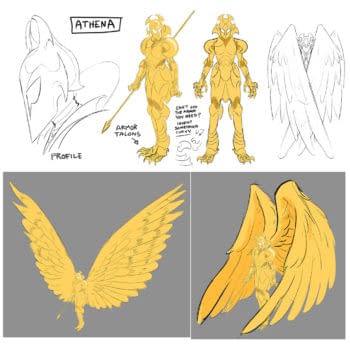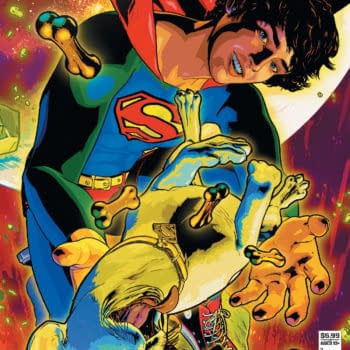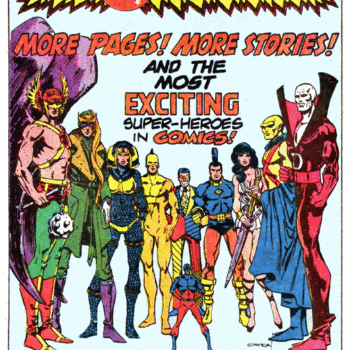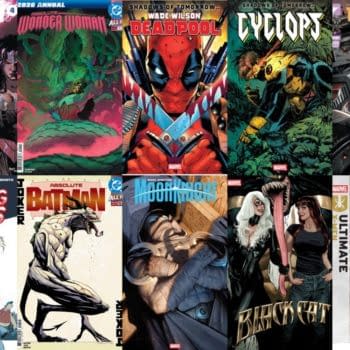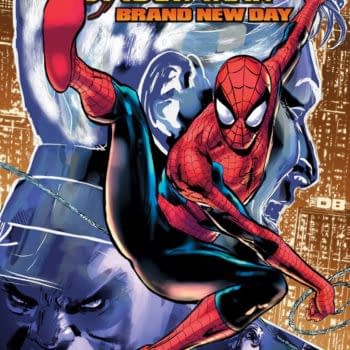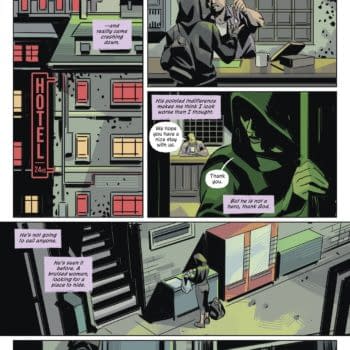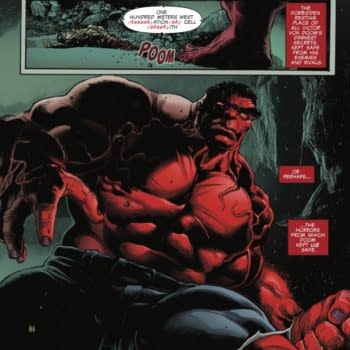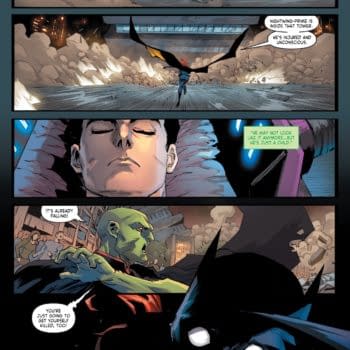Posted in: Comics | Tagged: Comics, dan slott, peter parker, superior spider-man
Does Superior Spider-Man Make Peter Parker Seem Pathetic?
By Hannah Means-Shannon
[*warning: spoilers for Superior Spider-Man #1-11 below]
Among other controversies at the launch of Superior Spider-Man (and there were plenty), setting aside the strange "death" of Peter Parker so that Otto Octavius could inhabit his body and become Spider-Man, there was a more general danger on a basic level of story-telling that placing Peter in the position of a ghostly co-inhabitant of his own body would make him appear pretty ineffectual or even pathetic. This danger became increasingly pointed as readers realized that Peter had no power to control his former body, and only the vaguest possibility of influencing Otto's thoughts while he operated in Peter's former life as a stand-in.
This wasn't an issue based on whether Peter's spectral reactions or emotions were believable enough or in character enough, since from the start his reactions were poignant and emotionally engaging for readers. It was a simple reality working its way through the story, or any story where the hero's hands are totally tied: heroes eventually seem wearing to the reader as righteous objectors who have no power to actually act any longer. Can a hero be a hero when there's nothing they can do to take on a hero role? Objection and suffering are well and good, certainly part of being a hero in comics these days, but given enough time, the situation of inaction is going to diminish their stature for the reader. One can certainly be heroic within an essentially imprisoned position, but can one still be viewed as a super-hero? Diminishing a hero's powers and playing at length upon their weaknesses is not at all new to superhero comics, and some of the most moving and beloved story arcs for readers have been the stories that stripped a hero down to their bare humanity and allowed them to pull themselves up from the mire, with or without their powers. Demon in a Bottle is still cited as a ground-breaking arc for Tony Stark, and it's still a common thing for a hero to lose their powers for an issue or two to touch base with fans and put characterization under a microscope.
But eleven issues in, the creative team behind Superior Spider-Man are really courting a dangerous diminishment of Peter's stature as a hero by continuing to present his ineffective resistance for so long. Of course, one of Peter Parker's, and Spidey's most recognizable and attractive features is his ability to bring humor to a situation through dialogue, his famous "quips", and he still has that going for him as he operates with the reader for audience, haranging Otto's missteps, and even attempting to warn him. His ability to be "heard" by Otto is slow in developing, but Otto has this ability to insult too, commenting to himself (and the reader) on Peter's weaknesses and bad strategies as Spider-Man as he encounters their limitations and breaks them down. In issue #7, Peter finally finds he can control Otto's hand while he's asleep, which seems like a potentially significant thing, but when you consider what Peter usually gets up to in terms of heroic feats, it's a tiny window of autonomy. It shows Peter's persistence, and that his spirit isn't broken by the situation, but it doesn't exactly help him make strides towards reclaiming super-hero status.
Being able to yell "Stop!" and be heard by Otto in issue #7, as well as being able to daze and throw Otto off his game as Spider-Man is a little more of a demonstrable victory that chalks up some points for Peter. Peter's enthusiasm watching the Avengers beat up Otto/Spidey, and cheering them on is amusing, and a sympathetic relief for the reader watching Peter struggle powerless for so long, but it does make him appear to be a figure who needs others to fight his battles for him. He can't take on the bully himself, so he's hoping the Avengers will step in and fight for the little guy. Even Peter's ability to distract Otto enough to draw a rudimentary explanatory picture and pass it to the Black Widow fails miserably as she interprets his octopus pictogram for a Spider. All of this serves tension in the story, and keep the reader interested in Peter's plight, but doesn't it also erode the character for the reader? Peter becomes a smart, determined person with a familiar personality, but he's no longer operating as a hero. He's very much a benched player all this time.
Only in issue #9, when Otto and Peter can finally talk directly to one another via Otto's reclaimed Neurolitic Scanner do we really see a less fettered Peter reasserting some of the determination and idealism that reminds us that he's a hero, too. It's a very strong issue, and one readers had been waiting for, expecting a final face-off over who will get to be Spider-Man. When Peter calls on his friends and family to help him within the psychological landscape of Parker's brain in issue 9, it does raise appropriate questions about identity and heroism, as he states that they are a major part of his strength and contribute to his role as a hero. When Otto calls in Peter's anxieties and fears to combat these positive forces, it rings true for readers in psychological terms. It makes you wonder, has Peter really never confronted these things before? Is this avoidance somehow part of his imprisonment at the hands of Otto?
It may be a good thing that Peter has to face down what disturbs him the most within his own mind. But this, however, doesn't seem to be the main point of the issue. Otto "wins", destroying Peter's remaining personality by removing his memories. He does this by becoming certain himself that he is the "good guy", a better hero than Peter could ever be, and convincing Peter that he's not a very good hero, really. This is a pretty resounding defeat for Peter, and seems to usher him off the stage as a player in Superior Spider-Man. He seems to be "gone", the struggle for control over. Peter's been defeated by things that bring human beings down, a loss of relationships, a loss of sense of self, and a loss of confidence in one's own moral compass. That's recognizable and meaningful for readers, but it seems to take Peter further into a non-hero role from which, even if he somehow survives this encounter, it's going to be difficult to emerge.
Ironically, it's only when Otto operates as a "free" person in Peter's body that Peter's former hero role seems to assert itself and maintain a presence more strongly in the story. Though all 11 issues so far wrestle page by page with the definitions of hero and villain and attempt to negotiate the relationships between the two roles, often admitting openly that Otto's methods as Spidey are more expedient and effective if morally dubious, only in issue 10 does Otto begin to admit that he feels limited. What is he limited by, exactly? The legacy of Peter's daily life and his legacy as Spider-Man. It becomes gradually clear that these are things that Otto cannot escape, even after erasing Peter's memories and decisively working against many of Peter's established methods as Spider-Man. Otto begins to feel "trapped" and that means that Peter, even though "gone" from his mind and from the reader, is still asserting himself in Otto's life. That has an unusually powerful impact on turning this diminishment of Peter as a hero around.
It takes the focus away from all the series issues wherein Peter has been disempowered and emphasizes instead his long history as a hero. It suggests that his achievements as a hero haven't simply gone away. Even Otto starts to realize that and considers it a "price" he has to accept for his new life. But Otto, in issue #11, facing the escape of the Spider-Slayer, still thinks he's got everything under control. In impressive feats of forward-thinking, he's cut off every possible escape route for the slayer of Jameson's wife at the time of his scheduled execution. His oversights, though, are gradually coming back to bite him. He underestimates Jameson's rage and determination, as Jameson rejects protection and seeks to kill the Spider-Slayer himself, and he is gradually walking into his own come-uppance as the villains he has maimed through use of extreme force are re-empowered by the Spider-Slayer's technology and are literally, ready to come back to haunt him.
Things are stacking up against Otto for the first time in the series so far; before this point, he's had his share of challenges, but he's always had clever strategies ready to turn things in his favor. The reader realizes at this point that Peter's methods would have brought about different outcomes. Peter would have realized Jameson's erratic behavior was likely and Peter wouldn't have placed a group of super-villains in an infirmary where they'd be gunning for an opportunity to serve a new savior. Even more ambiguously, however, Otto is given a choice about who to save at the end of issue 11, a "Hobson's Choice", and his reply is "none of them". He rejects the classic superhero paradigm wherein he would have to choose, somehow, the value of some lives over others, something Peter would never do unless he had a plan to somehow save them all. He's admirably focused on his mission of killing the Spider-Slayer, but these are not the actions of a superhero. In the context of Peter Parker's career as Spider-Man, Otto's performance is slipping.
If it's a contest, the former champion is not really being challenged by his successor in the way that earlier issues in the series led the reader to believe. So far in Superior Spider-Man, Peter may have suffered a gradual loss of status to the point that it will be a very big task to build him up again (should be return) but Parker's version of Spider-Man, as a legendary figure, is resurging and overtaking the short-term reign of Otto as Spider-Man. Peter has been rendered more and more pathetic in his inability to act in the series. As a nearly passive observer, he's changed for the reader and hasn't been able to display the qualities that make a hero to remind readers what he's capable of. But fortunately, that can't erase his actions in the past, and the long-term effects of his tenure as Spider-Man for the reader. Even as an absentee, Parker's Spider-Man continues to challenge whether Otto's Spidey is really as "superior" as he keeps insisting he is.
Hannah Means-Shannon writes and blogs about comics for TRIP CITY and Sequart.org and is currently working on books about Neil Gaiman and Alan Moore for Sequart. She is @hannahmenzies on Twitter and hannahmenziesblog on WordPress. Find her bio here.










